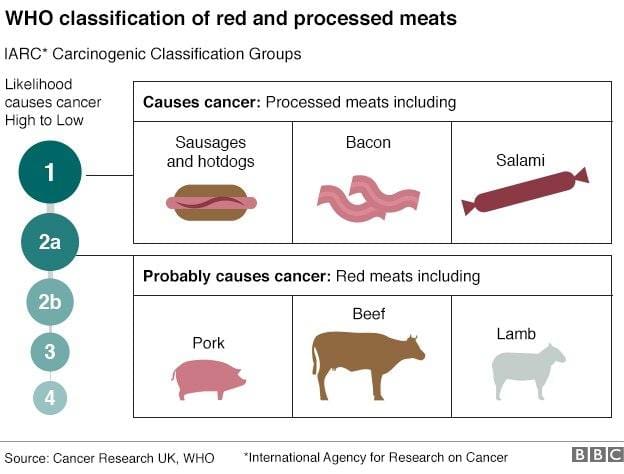High meat consumption has become a hallmark of modern diets, but its growing popularity comes with significant health risks that deserve attention. While meat is a rich source of protein and essential nutrients, excessive intake—particularly of red and processed meats—has been linked to serious health concerns such as heart disease, cancer, obesity, and antibiotic resistance. From the saturated fats and harmful compounds in processed meats to the overuse of antibiotics in animal agriculture fueling drug-resistant bacteria, the dangers are well-documented by scientific research. This article explores these pressing health hazards while offering practical tips for making informed dietary choices that prioritize balance and long-term wellness. Whether you’re a devoted carnivore or exploring plant-based alternatives, understanding how high meat consumption impacts your health is key to maintaining a healthier lifestyle
In recent years, there has been a growing trend towards high meat consumption in many parts of the world. From fast food restaurants offering oversized burgers to upscale steak houses serving massive cuts of meat, the availability and appeal of meat-based dishes seem to be on the rise. While meat has always been a significant part of human diets, the current levels of consumption are unprecedented. However, this increase in meat consumption comes with a cost – not just to the environment, but also to our health. Despite the protein and nutrient-rich qualities of meat, excessive consumption has been linked to a range of health hazards. From heart disease and obesity to cancer and diabetes, the risks associated with high meat consumption are well-documented. In this article, we will delve into the various health hazards of consuming too much meat and provide readers with important information on how to make informed dietary choices for a healthier lifestyle. Whether you are a carnivore, flexitarian, or vegan, understanding the potential risks of high meat consumption is crucial in maintaining overall well-being. Let’s explore this topic further and uncover the important facts you need to know about the health hazards of high meat consumption.

Elevated risk of heart disease
High meat consumption has been consistently linked to an elevated risk of heart disease in numerous studies and supported by expert opinions. The excessive intake of red and processed meats, such as beef, pork, and sausages, has been associated with an increased likelihood of developing cardiovascular problems, including coronary artery disease, heart attacks, and stroke. The high levels of saturated fats and cholesterol present in these meats can contribute to the build-up of plaque in the arteries, leading to restricted blood flow and potential complications. Additionally, the heme iron found in red meat has been linked to oxidative stress and inflammation, further exacerbating the risk of heart disease. To mitigate this risk, health professionals recommend adopting a balanced diet that includes lean sources of protein, such as poultry, fish, legumes, and plant-based alternatives.
Cancer risk from meat consumption
Numerous scientific studies have shed light on the potential link between meat consumption and an increased risk of cancer. Epidemiological evidence suggests that a diet high in red and processed meats may contribute to the development of several types of cancer, including colorectal, pancreatic, and prostate cancer. The World Health Organization’s International Agency for Research on Cancer (IARC) has classified processed meats as a Group 1 carcinogen, indicating that there is sufficient evidence to support their role in cancer formation. The harmful compounds formed during the processing and cooking of meat, such as heterocyclic amines (HCAs) and polycyclic aromatic hydrocarbons (PAHs), have been identified as potential carcinogens. Moreover, the high intake of saturated fats and cholesterol found in meat products may promote inflammation and cellular damage, further increasing the risk of cancer development. It is important to note that while the association between meat consumption and cancer risk has been observed, individual susceptibility and other lifestyle factors also play a significant role. Thus, adopting a balanced diet rich in fruits, vegetables, whole grains, and lean protein sources can help reduce the risk of cancer and promote overall health.

Antibiotic resistance and meat consumption
The issue of antibiotic resistance is another concerning aspect of high meat consumption. Antibiotics are commonly used in animal agriculture to promote growth, prevent diseases, and treat infections. However, the overuse and misuse of antibiotics in this context have led to the emergence of antibiotic-resistant bacteria, posing a serious threat to human health. When animals are continuously exposed to antibiotics, it can create an environment where bacteria develop resistance to these drugs, making them less effective in treating human infections. There is evidence to suggest that consuming meat from animals treated with antibiotics can contribute to the transmission of antibiotic-resistant bacteria to humans. This not only limits our ability to effectively treat infections but also increases the risk of severe illness and complications. To address this issue, it is crucial to promote responsible antibiotic use in animal agriculture and to consider alternative methods of disease prevention and treatment that do not rely solely on antibiotics.
Experts weigh in on dangers
A deep dive into the links between meat consumption and various health issues such as heart disease, cancer, and antibiotic resistance, supported by scientific studies and expert opinions, sheds light on the potential dangers of high meat consumption. Experts in the field have expressed concerns about the impact of excessive meat consumption on human health. Research has shown that diets high in red and processed meats have been associated with an increased risk of heart disease and certain types of cancer. Additionally, the World Health Organization has classified processed meats as carcinogenic, highlighting the potential risks they pose. Moreover, the overuse of antibiotics in animal agriculture, commonly linked to meat production, has contributed to the rise of antibiotic-resistant bacteria, which can compromise the effectiveness of antibiotic treatments in humans. These findings emphasize the need for individuals to be mindful of their meat consumption and consider incorporating a balanced and varied diet for optimal health.
Scientific studies support findings
Scientific studies consistently support the findings linking high meat consumption to various health issues such as heart disease, cancer, and antibiotic resistance. These studies provide robust evidence that supports the concerns expressed by experts in the field. For instance, numerous research studies have demonstrated a clear association between diets high in red and processed meats and an increased risk of developing heart disease and specific types of cancer. Furthermore, the classification of processed meats as carcinogenic by the World Health Organization further strengthens the evidence of the potential risks associated with their consumption. Additionally, the overuse of antibiotics in animal agriculture, which is closely tied to meat production, has been extensively studied and found to contribute to the development of antibiotic-resistant bacteria, posing a significant threat to human health. By considering the wealth of scientific evidence available, it becomes evident that reducing meat consumption can play a crucial role in maintaining optimal health and mitigating potential health hazards.
In conclusion, it is important for individuals to be aware of the potential health hazards associated with high meat consumption. While meat can be a valuable source of protein and other nutrients, it is important to consume it in moderation and to opt for leaner, healthier options. By making informed choices about our diet and incorporating a variety of plant-based foods, we can reduce our risk of chronic diseases and improve our overall health and well-being. As always, it is recommended to consult with a healthcare professional for personalized dietary recommendations. Let’s prioritize our health and make mindful choices when it comes to our diet.

FAQ
What are the potential health risks associated with consuming high amounts of meat?
Consuming high amounts of meat can increase the risk of various health issues. Red and processed meats have been linked to an increased risk of heart disease, stroke, certain types of cancer, and obesity. These meats are often high in saturated fats, cholesterol, and sodium, which can contribute to these health problems. Additionally, excessive meat consumption may lead to a deficiency in essential nutrients found in plant-based foods, such as fiber, vitamins, and minerals. It is important to maintain a balanced diet that includes a variety of foods to minimize the potential health risks associated with consuming high amounts of meat.
How does high meat consumption contribute to the development of chronic diseases such as heart disease and cancer?
High meat consumption has been linked to an increased risk of chronic diseases like heart disease and cancer due to several factors. Firstly, red and processed meats contain a high amount of saturated fats and cholesterol, which can raise blood cholesterol levels and increase the risk of heart disease. Additionally, cooking meat at high temperatures can produce harmful compounds like heterocyclic amines and polycyclic aromatic hydrocarbons, which are known carcinogens. High meat intake is also associated with lower intake of fiber, antioxidants, and other beneficial nutrients found in plant-based foods, which are protective against chronic diseases. Overall, reducing meat consumption and opting for a more balanced diet can help lower the risk of developing these conditions.
Are there any specific types of meat that are more harmful to health when consumed in excess?
Yes, certain types of meat can be more harmful to health when consumed in excess. Processed meats, such as bacon, sausages, and deli meats, are often high in sodium, saturated fats, and added preservatives, which have been linked to an increased risk of heart disease, cancer, and other health issues. Red meats, especially those high in fat like beef and lamb, can also pose health risks when consumed in excess. These meats contain higher levels of saturated fats and cholesterol, which are associated with a higher risk of cardiovascular diseases. It is recommended to consume these types of meats in moderation and opt for leaner cuts or alternative protein sources for a balanced diet.
What are some alternative protein sources that can be incorporated into a diet to reduce meat consumption and lower health risks?
Some alternative protein sources that can be incorporated into a diet to reduce meat consumption and lower health risks include legumes (such as lentils, beans, and chickpeas), tofu and other soy products, quinoa, nuts and seeds, and plant-based protein powders. These options are rich in protein and often contain other beneficial nutrients like fiber, vitamins, and minerals. By diversifying protein sources and incorporating more plant-based options, individuals can reduce their reliance on meat, which may help lower the risk of certain health issues like heart disease, obesity, and certain types of cancer.
How can individuals strike a balance between enjoying meat as part of a healthy diet and avoiding the health hazards of excessive meat consumption?
Individuals can strike a balance between enjoying meat as part of a healthy diet and avoiding health hazards by practicing moderation and making informed choices. It is important to consume lean cuts of meat and limit processed meats, as they are often high in saturated fats and sodium. Incorporating a variety of plant-based foods into meals can provide essential nutrients and reduce the reliance on meat. Additionally, considering alternative sources of protein, such as legumes, tofu, and fish, can help diversify one’s diet. Regularly monitoring portion sizes and being mindful of the overall balance of nutrients in meals is crucial for maintaining a healthy lifestyle.



